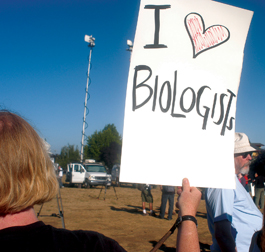home | metro santa cruz index | news | santa cruz | news article

Love Notes: Demonstrators at Monday's rally at the UCSC campus declare their affections.
Unpopularity Contest
Santa Cruzans aren't fond of firebombers
By Curtis Cartier
Among the crowd of 200 students, teachers, neighbors and friends holding signs and shouting slogans into the hot and dusty air was a sense of bleakness—an undercurrent of belief that people prepared to set off bombs at university professors' homes don't care about a few sign-waving protesters.
Still, the main entrance to UCSC is no stranger to organized dissent, and with signs in hand, community members stood together Monday and shouted for justice. What else could they do? Last weekend's widely publicized attacks on two researchers shook everybody up.
James Beacham, a recent UCSC graduate, spoke in textbook brevity about the "benevolence" of science's goals and how it justifies tests on animals.
"Actions like this remove the issue from public dialogue because people are afraid to talk about it," he said. "This kind of thing is the same, in a way, as the PATRIOT Act because it makes people afraid to speak out."
Dave Deamer has been a biological chemist for nearly 50 years and proclaimed that he felt just as safe as he did a week ago. He also offered a critique of the attackers' logic. "You have to think about the ethics and decide that animal's life is worth the same or more than a human's," Deamer said. "There are legal ways to protect animals. They have an imbalance in their reasoning."
The Saturday morning pre-dawn calm was shattered when, around 5:40am, a Molotov cocktail–like device exploded on UCSC molecular biologist David Feldheim's front porch while he and his family slept inside. Four minutes later, another bomb took out the car of a second researcher. No one was killed in the blasts, but police say Feldheim injured his feet when he, along with his wife and two small children, were forced to flee their burning house through a window.
The bombings made good on what may have been a promise. Five days ago, a pamphlet turned up at Caffe Pergolesi containing the names, addresses and photographs of 13 UCSC faculty members. "Animal abusers beware; we know where you live; we know where you work; we will never back down until you end your abuse," it reads.
Santa Cruz Police held a press conference Monday at the Police Department headquarters, where Police Chief Howard Skerry and Santa Cruz Mayor Ryan Coonerty said they'll pay $30,000 for information on who these guys are.
"A significant amount of physical evidence was collected, including witness statements and surveillance camera footage," said Skerry, speaking in front of a bristling wall of television cameras and microphones. "We have a family attacked in the sanctity of their home. Children were involved. This is unacceptable."
No group has yet claimed the attacks, but police have mentioned the Animal Liberation Front—one of the largest militant protest groups in the world—as a suspected organization. Although its credo mentions taking "necessary precautions against harming any animal, human and non-human," the ALF is loosely organized; activists form more or less independent cells.
Camille Hankins, spokeswoman for the ALF, said the people responsible for the attacks were "probably haunted by something they saw or stories they heard about animals being mutilated, burned alive, tortured or poisoned."
"I think these people do what they feel is justified," Hankins said. "With the atrocities that we've seen in the laboratories, it's amazing that animal rights activists have had this much restraint."
The bulk of the criminal investigation has been handed over to the FBI, which, Skerry said, is better equipped than local police to handle these types of cases.
Meanwhile, Michael Budkie, founder of Stop Animal Exploitation Now!, an Ohio-based animal rights activist network that publishes information about laboratories and researchers, including some information found on the threatening pamphlets found in Caffe Pergolesi, said his organization had nothing to do with the firebombings.
He also said laboratories at universities like UCSC are home to lawless acts of animal cruelty. "These laboratories have nonhuman primates that are deprived of water and food for days at a time," Budkie said. "If you did this in your home, you could be arrested and charged with animal cruelty. But because these scientists say it's OK, they're allowed to do it."
At Caffe Pergolesi, general manager Aaron Thompson said he had no idea who might have left the fliers at the coffeehouse and that people who want to bring about change need to do so without violence.
"For someone like me who wants to raise a family here, it really hits home," Thompson said. "People need to spread awareness through education, not something like this."
"It's terrible. This is a huge threat to academic freedom," said David Keller, director of Residential Services at UCSC and neighbor to the researcher whose car was destroyed.
"I have a child and he was terrified. Given the nature of fire, it could have easily spread to my house or someone else's house."
In an email to students and staff, UCSC Chancellor George Blumenthal called the attacks "odious assaults on individuals and on the principles of free inquiry by which we live."
"These unconscionable acts put the researchers, their families, including their children, and their neighbors in grave danger," reads the email.
Along with FBI and local police, agents from the Bureau of Alcohol, Tobacco and Firearms are reportedly involved with the investigation. Anyone with information on the attacks should contact Santa Cruz Police at 831.420.5800 or leave a tip on the anonymous tip line at 831.420.5995.
Send a letter to the editor about this story.
|
|
|
|
|
|